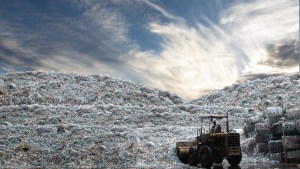Lenten Campaign 2025
This content is free of charge, as are all our articles.
Support us with a donation that is tax-deductible and enable us to continue to reach millions of readers.
A recently released study on the effects of micro and nanoplastics deposited in soil on the growth of plants found them to have a negative impact on produce. The study was conducted by Luigi Lucini and Mark Trevisan, of Milan’s Catholic University of the Sacred Heart’s Food and Environmental Sciences department, and published in the journal Plant Physiology and Biochemistry.
According to Nova News, the study found that the presence of microscopic particles of plastic in the soil could place a plant’s metabolism and nitrogen cycle at risk. The latter is the process by which nitrogen is biochemically altered into multiple chemical forms as it circulates the various ecosystems. It is a very important process for maintaining biodiversity and crop nutrition.
While the impact of plastic particles on aquatic environments has been studied for decades, the study of its effect on terrestrial environments has only just begun. It is estimated that some 63,000 tons of microplastics and nanoplastics are deposited annually in Europe’s agricultural lands, with the US estimating some 44,000 tons. The deposits occur mainly due to contaminated water, compost, as well as plastic materials used in agriculture and atmospheric deposition.
Lettuce lessons
Plastic is well known for its slow degradation pace, and while it can be broken down by certain physical and biological agents, it breaks down into microscopic particles of plastic that are potentially toxic. Even today, it is difficult for experts to identify, quantify, and fully understand the potential risks that microplastics have on soil, plants, foods, and human tissues.
For this study, the researchers focused on lettuce plants and their development in soil with various levels of microplastic content of a variety of different sized particles. They found that the size of the particles played a “fundamental role in influencing various aspects of lettuce growth.” This included the plant’s size, chlorophyll concentration, leaf area, and photosynthetic activity.
Smaller particles were found to affect a plant’s structure and biochemistry, while larger particles had a greater impact on root metabolism. The presence of plastic particles in soil was linked to anomalies in the nitrogen cycle.
Of the intricate relationship between specific plastic contamination, nitrogen dynamics, and plant performance, the authors wrote:
“The presence of metabolic alterations also in leaves, i.e. in organs not directly exposed to micro- and nanoplastics, also opens up the possibility that these could be absorbed and translocated into agricultural crops, posing a possible food safety problem. Furthermore, the effect on the nitrogen cycle implies a possible impact on the effectiveness of nitrogen fertilizers, and consequently an effect on the sustainability of crops.”



